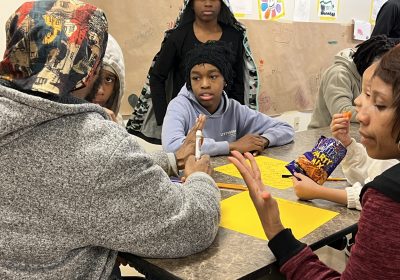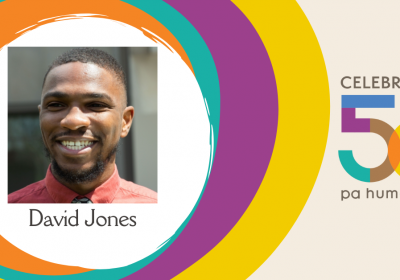By Karen Price
The capacity crowd at City of Asylum’s live storytelling event on Pittsburgh’s North Side sat silent and still, focused on Abdi Lugundi’s every word.
The theme of the evening was culture shock, and though Lugundi stood on stage as an adult, the emotions he evoked from his first day of school in Pittsburgh as a little boy felt raw. He’d immigrated to the city from the Kakuma Refugee Camp in Kenya, where large numbers of Somali Bantu people settled after escaping persecution and death in Somalia in the 1990s, and suddenly was the center of unwanted attention. The teacher made him stand at the front of the classroom while she spoke, but he couldn’t understand her words. The other students stared and giggled as he walked the rows looking for an empty seat.

“The instructor started teaching, but the person behind me started kicking my seat. Why?” he said. “I raised my hand like I did in my old school to get the teacher’s attention. When the instructor finally saw my hand I pointed to the person who was kicking my chair. I didn’t know how to communicate what I was trying to say and the whole class started laughing. This is my reality. I will be the different one. I am not home. These are not my people. I want to go home. I don’t want to come back to this. Being in the camp was a better lifestyle. No one laughed at you, and if they did, it didn’t feel like this. No one made you feel different.”
Stories are at the very core of the humanities. They often entertain, but they also create awareness and appreciation of the experiences of others and help people to better understand themselves and the world around them. Stories are at the heart of what City of Asylum does as well. The nonprofit recently received a PA SHARP grant – Sustaining the Humanities through the American Rescue Plan – from PA Humanities to help with organizational costs and capacity building as they grow and recover from the challenges of the pandemic.
City of Asylum was founded in 2003 as a refuge for writers facing persecution in their home countries, and is now the largest residency program in the world for writers living in exile. They currently provide sanctuary for four writers, one musician and one filmmaker, who get housing, a stipend, legal counsel, medical benefits and access to professional development in order to help them transition to a new, stable life where they can continue to create and find work in the U.S.
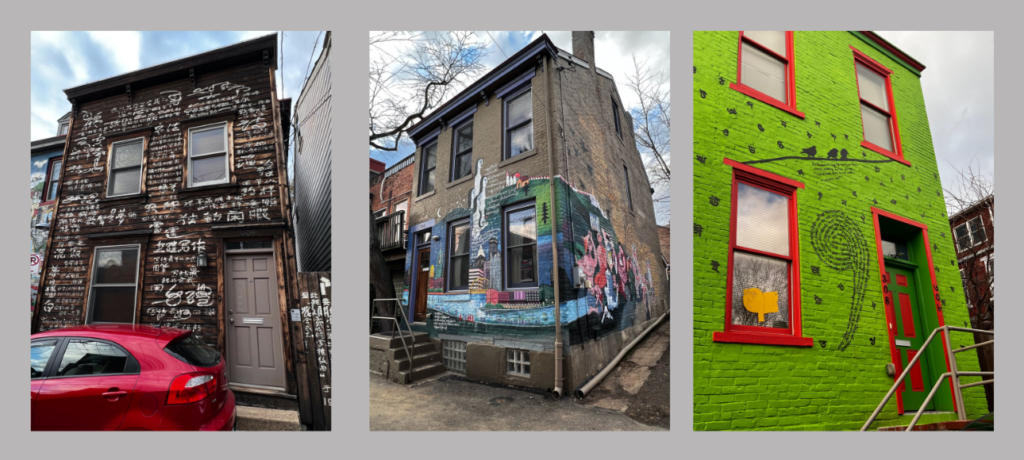
In recent years, City of Asylum has also become a regional cultural hub where writers, storytellers, musicians, poets and artists can find a platform. They opened Alphabet City just blocks from where the sanctuary houses are located, and the building hosts a performance space, restaurant, and bookstore specializing in translated works. Throughout the pandemic the organization has provided virtual and, more recently, in-person programming including author talks, readings, concerts and films. During the heart of the pandemic in 2020, they opened their space and streaming capabilities to any organization in Pittsburgh that needed it to conduct virtual programming, free of charge.
All City of Asylum programming is free to the public, whether virtual or in-person.

The storytelling event during which Lugundi shared his story is a new partnership with Story Club Pittsburgh. Members of the public can sign up to share five- to eight-minute true stories about themselves around a different theme each month, and there are also featured storytellers.
Eight people took the stage just days before World Storytelling Day, which was March 20, to tell their stories of culture shock. They included everything from tales of traveling abroad to moving from a city in Kazakhstan to a Wisconsin dairy farm as an exchange student to being called a racial slur for the first time after moving to Pittsburgh from predominantly Black and Brown neighborhoods in Toronto and Miami. The program was also presented in partnership with City Theatre and World Affairs Council of Pittsburgh.
One storyteller was Anouar Rahmani, a writer and human rights defender from Algeria who is one of City of Asylum’s resident writers. He joked about how Hollywood gave him the impression that America is a chaotic place where the police or FBI can show you ID and demand your car at any moment to go chase a criminal and you’ll never see it again. He also had the audience giggling at his expectations of landing in the greatest country in the world compared to the reality of landing at JFK International Airport, and people’s insistence on asking him if he was enjoying the Pittsburgh winter weather.
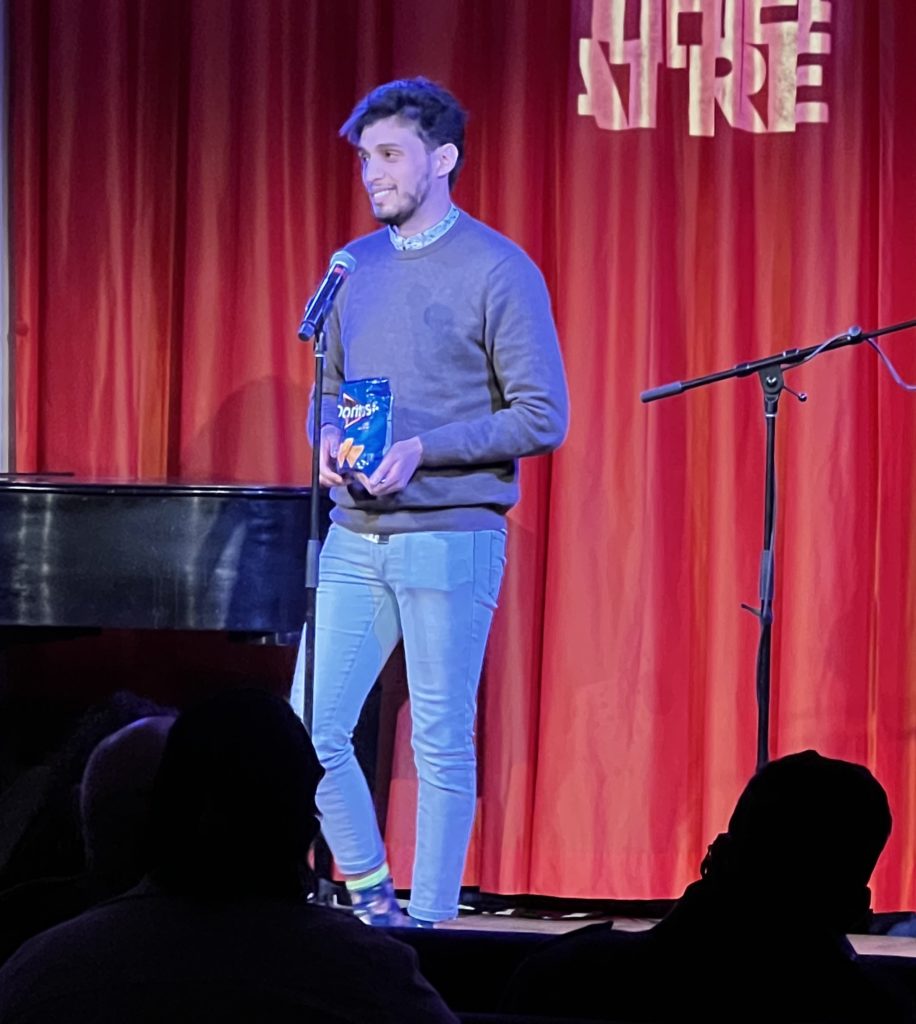
“I used to answer yes,” said the author of four novels in Arabic who in 2015 became the first person to publicly demand same-sex marriage in Algeria. “As a joke.”
He also described what it was like arriving at City of Asylum and being given a big house and a kitchen filled with food that he didn’t necessarily know how to cook.
“So I went to the market and I bought this bag of chips, Doritos,” he said, clutching a bag in his hands. “I ate Doritos for almost a month and it was love from first taste.”
In addition to the in-person crowd, over 100 tuned in online through Crowdcast. City of Asylum continues to offer virtual options for most in-person programming, making it accessible not only to those who may not yet feel comfortable in a crowd but also those who have to work, have transportation issues, are caregivers or who are located elsewhere in the country or even the world.
“Core to our mission is bringing the world to Pittsburgh and bringing Pittsburgh to the world,” executive director Andrés Franco said.
Lugundi ended with a hopeful note for anyone who experienced classroom bullying or was made to feel different. He recently graduated from Allegheny College, is the founder and CEO of his own youth program that helps support African youth and just started his first full-time job as the youth leadership coordinator for Aryse, a Pittsburgh-based organization that helps refugee and immigrant youth to become engaged, confident and celebrated members of their communities.
The room erupted in cheers and applause.
“That’s what storytelling and the arts and humanities do is you get a glimpse into another person’s life and start to understand and connect with people on a personal level,” Franco said. “It moves you. You can have people explain to you, but it’s only when you have that personal connection that you understand what that person is going through at a human level.”

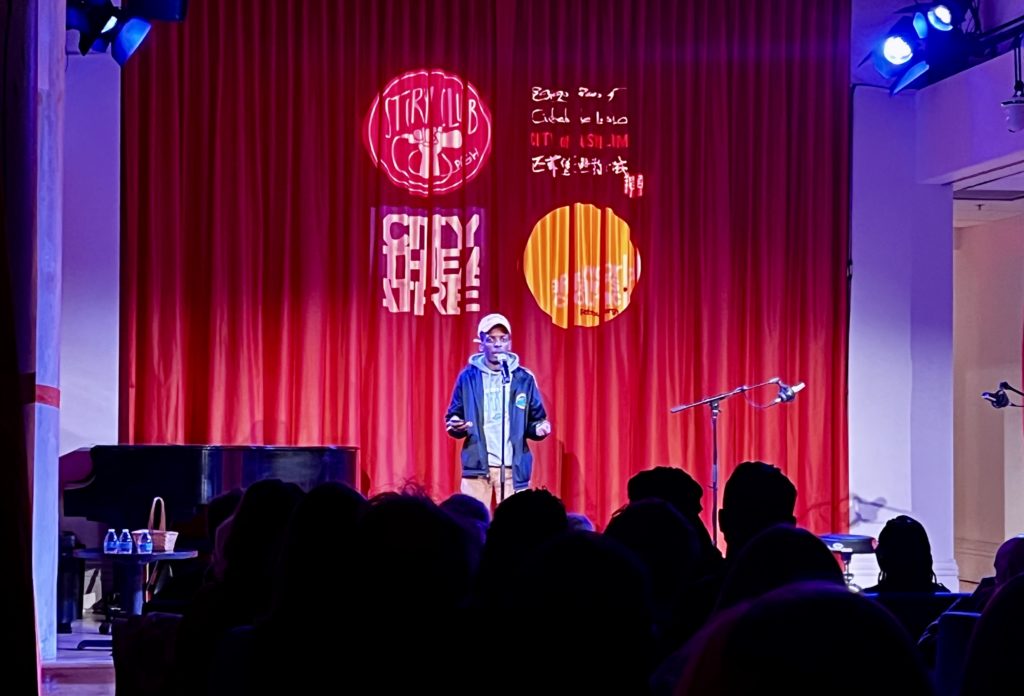
![[color – dark bg] PA SHARP FINAL FILES DB 72dpi [color - dark bg] PA SHARP FINAL FILES DB 72dpi](https://pahumanities.org/uploads/files/elementor/thumbs/color-dark-bg-PA-SHARP-FINAL-FILES-DB-72dpi-phgl7aimtfdpzt2rscvl43ksfv3asbbls19lsvuacw.jpg)
